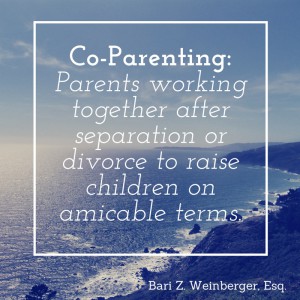5 Rules for Successful Co-Parenting After Divorce
Co-parenting is often considered the gold standard for parenting after divorce, but what does this term even mean?
Sometimes called joint or collaborative parenting, co-parenting refers to parents working together following their separation or divorce to raise their children on amicable terms. In practice, this typically means former spouses making a commitment to put negative feelings they may harbor towards each other on the back burner in order to put their children’s needs first.
Co-parenting is growing in popularity, mainly because it’s not an empty buzzword: according to child psychologists, children of divorce who grow up with adults who co-parent tend to feel more secure and loved by both parents and more at ease and accepting of their changed family circumstances.
Taking a child-centered approach to raising children requires empathy, patience and open communication from all involved adults. Ready to give it a try, or at least willing to learn more? Even if you and your spouse are are recently separated or still working through the finer points of your divorce, or already divorced and have a child custody agreement in place, it’s never too early — or too late — to take a collaborative approach. Here are 5 tips for co-parenting success.
Treat Co-Parenting as a New Relationship: Your marital relationship may be over, but your new relationship as co-parents is just beginning. If emotions are still raw or running high, a good first step can be to think of running your co-parenting relationship like a business partnership (with the “business” being the raising of your kids). Need to figure out visitation schedules or make decisions about your child’s summer camps or after school schedule? Have a pediatrician’s check up next month and don’t know which parent can cover it? In coming up with answers to these issues, do your best to communicate with your ex as you would a colleague or co-worker — with cordiality, respect, and neutrality. Relax and speak slowly. In most situations, this tone will be mirrored back. Remember, many people who work together aren’t necessarily friends outside the office but still manage to get the job done — and done well!
Take Baby Steps Towards Long-Term Goals: Your child’s birthday is still a few months off, and you know it’s his dream to have both of you in attendance to celebrate. If hostility still rules your relationship with your former spouse, but you are both (grudgingly) on board with realizing your child’s wishes, set small goals for that can help you achieve this goal. For example, agree to a policy that any communication between the two of you when discussing your child will stick to the topic at hand. If you are discussing what time to pick your child up on Friday, adding, “don’t be late because you’re out somewhere with [name of new romantic partner]” is needlessly combative. Instead phrase the reminder in a more neutral tone, such as “Our pick up time is at 3 pm. Will you be able to make it?” From there, begin working on other areas, such as spending time with your former spouse and child as a dry run to the birthday party. Perhaps you both attend parent night at your child’s school, or a sporting event. These small baby steps can provide much-needed momentum towards realizing larger goals of peaceful parenting.
Aim for Consistency: Few things flare tempers between divorced parents as much as inconsistency with things like visitation pick ups and drop offs, or lateness with paying child support. When taking a collaborative approach to parenting, use all available tools at your disposal to keep as much consistency to your child custody routines as possible. To that end, think about using one of the many shared calendar apps made just for divorced parents. Some even include functionality to record and track child support payments.
Get Help: If making shared decisions, interacting with each another at drop-offs, or just speaking to a person you’d rather forget all about seem like impossible tasks, it doesn’t necessarily mean that co-parenting can’t work for the two of you — but it is a sign that you may need additional help, or at least a safe place to vent. For some people, this can mean seeking out the help of a therapist to work on the anger, resentment, or hurt that still exists in the relationship with your ex. Some co-parents choose to work through their issues together with a family therapist, in addition to individual counseling.
Keep Things in Perspective: One co-parenting must? Avoid putting your children in the middle. Sure, even the most committed of co-parents will have days when tempers flare and old hurts come to the surface. However, this is for the two of you to deal with, not your child. Plan now for these off moments by making commonsense rules you will both follow, including this very important one: don’t fight in front of your kids. Remember, co-parenting is not about your feelings, or those of your ex-spouse, but rather about your child’s happiness and stability. Co-parenting does take work (and sometimes a lot of it), but isn’t your child’s well-being worth it?
Are you in the process of divorce and wondering how co-parenting fits in with your child custody plans? We can help. Please contact us to schedule your initial attorney consultation.



